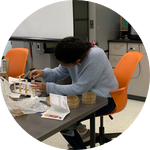About This Project
Aggregation of the synuclein-alpha, SNCA, protein can indicate Parkinson's Disease, PD, symptoms two years prior to diagnosis. Levadopa is a component in synthetic medicines for PD found naturally in plants. I hypothesize that if C. elegans are used as a model, natural levodopa-based medicines could decrease the aggregation of the SNCA protein and the intensity of PD symptoms because of the inversely related correlation between SNCA aggregation and dopamine production.
Ask the Scientists
Join The DiscussionWhat is the context of this research?
This research explores that if C.elegans are used as a model, natural medicines containing levodopa may decrease the aggregation of the SNCA protein and the intensity of PD symptoms. The initial inspiration for this research stemmed from having a family member get diagnosed with PD. After reading articles detailing a series of tests that analyzed the cognitive abilities of PD patients on and off medication, and discovering that patients off their medication had a higher ability to grasp new information and observations, the question came to life. The core of this experiment is to stray away from synthetic PD medication and promote natural levodopa based medication.
What is the significance of this project?
The significance of this research project is to observe the role natural PD medicines may be able to play in reducing the negative side effects of synthetic medication. It also targets the (synuclein alpha) SNCA protein, which isn't often observed when developing PD medication. With these two points of focus, results could provide insight on important focal points and components of PD medicine that have minimally been looked at prior. If more natural PD medications are created around the monitoring of SNCA levels, then there may be more supplemental options that could cater patients’ specific cognitive impairment.
What are the goals of the project?
We hypothesize C. elegans treated with levodopa will show a significant decrease in aggregation of SNCA protein when compared to untreated C. elegans. To test this we will use a C. elegans model and measure changes in the SNCA protein aggregation, in response to various plant extracts. The plant extract samples that will be tested are Mucuna Pruriens, Vicia faba, Vigna unguiculata, Vigna vexillata, Prosopis chilensis and Parkinsonia aculeata. To make these observations we require a microscope filter with the light microscope to visualize a fluorescent tag for SNCA on the model organism.
Budget
The budget of this project will be $1,600 in order to purchase the necessary microscope filter. This Leica Microsystems piece will be used with the light microscopes that are already available for this project, which accounts for the high cost since it is an older piece. All other materials needed for this experiment will be provided by the lab that it will be conducted in. The research program at Princeton High School can account for all other materials necessary for the project from their annual budget.
Endorsed by
 Project Timeline
Project Timeline
Once we launch the project, we have 30 days to reach our goal budget of $1,600.00. After this occurs, the microscope filter will be purchased and the trials can begin. Each of the three trials will last 15 days with one week between each for analysis.
Jan 23, 2019
Begin Collecting Control Data
Jan 23, 2019
Project Launched
Feb 04, 2019
End Three Week Control Data Period
Feb 20, 2019
Begin Trial 1
Mar 06, 2019
End Trial 1 and Analyze Results
Meet the Team
Nandita Ammanamanchi
I am currently a student at Princeton High School in New Jersey. I am a second year member of my school's research program which allows a select group of students to explore any field of science that is of interest to them. I chose to explore Parkinson's Disease as I have had family members who have been inflicted with the disease.
Additional Information
This research holds great relevance in the field of neurodegenerative diseases because many of the man-made medications given to patients cause negative side effects that can outweigh the benefits. This work can impact research areas outside of this field, and can set a precedent for introducing natural medicinal practices into larger clinical fields. After obtaining various plant samples of natural components in general PD medication, i.e. levodopa from Mucuna pruriens and exposing C. elegans to such supplements, the SNCA presence in the model organism will be tracked and monitored over time to observe the effects of natural medicine.
Project Backers
- 28Backers
- 100%Funded
- $1,603Total Donations
- $57.25Average Donation

